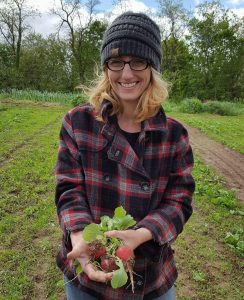Creation Justice and Church 3.0: An Interview with Cyndy Ash
 Progressive Christian leaders such as Cameron Trimble and John Dorhauer have been leading a discussion about the historical trajectory of churches and what the future holds as the body of Christ evolves. In his book Beyond Resistance: The Institutional Church Meets the Postmodern World, Dorhauer summarizes the conceptual framework proposed by Trimble by describing the pre-Reformation Church as Church 1.0, the post-Reformation Church as Church 2.0, and “whatever is emerging as Church 3.0.” Through a series of interviews, my goal is to bring into this conversation the voices of those who are envisioning and bringing to life Church 3.0 with a notable emphasis on creation care and justice.
Progressive Christian leaders such as Cameron Trimble and John Dorhauer have been leading a discussion about the historical trajectory of churches and what the future holds as the body of Christ evolves. In his book Beyond Resistance: The Institutional Church Meets the Postmodern World, Dorhauer summarizes the conceptual framework proposed by Trimble by describing the pre-Reformation Church as Church 1.0, the post-Reformation Church as Church 2.0, and “whatever is emerging as Church 3.0.” Through a series of interviews, my goal is to bring into this conversation the voices of those who are envisioning and bringing to life Church 3.0 with a notable emphasis on creation care and justice.
My first interview in this series is with Cyndy Ash who owns a five acre organic produce and livestock farm in central Illinois called Jubilee. In April, Jubilee Farms will also become a worshipping community. It will then become the second farm church in the country after one established by the Presbyterian Church (USA) in Durham, North Carolina.
Tell me about the mission and vision of Jubilee Farms.
Jubilee Farms has a two-fold mission. On the one hand, it seeks to provide the community, both those with financial means and those without, with locally grown produce, farmed sustainably without pesticides or synthetic fertilizers. On the other, it seeks to serve as a gathering place for the wider church community for worship, mission, education, and community building.
The vision of the Jubilee Farms is to have a farm church, a community of believers, which together work towards its mission. We will work together on the farm every Saturday, followed by worship in the barn or outside weather permitting, then share a meal together. Jubilee Farms Church will be supported by shares of produce sold to members of local churches, as well as members of the farm church. The more shares we sell, the more we will be able to donate. Ideally, we would be able to expand, sell more shares, donate more shares, provide jobs to those society has deemed as “unemployable.” In a nutshell, the vision of Jubilee Farms is to be a church without walls which lives out its mission every day in a very real tangible way.
What is the significance of the word “Jubilee” for you in this ministry?
I chose the word “Jubilee” based on its context in the book of Leviticus. The term embodies multiple concepts there. The first is honoring the land by letting it rest. Today, farmland is pushed beyond its limits. I am committed to preserving the land for future generations and to not using synthetic pesticides or fertilizers. Therefore, I must allow the land to rest. Second, “Jubilee” embodies the idea of the land being communal. Land was returned to families, even though they couldn’t pay off their debts. They understood that the land belonged to God, they were stewards. I, too, am a steward. This land is for the benefit of my community. Finally, the term embodied practices honored to feed the poor. If the land is communal, and we are called to be good stewards, then it follows that we provide for all members of our community. Jubilee Farms is committed to sharing the harvest.
As Christians today re-think and re-envision what it means to be church, what insights or perspectives do you consider important, especially in relation to creation care and social justice?
I’m forty, and in my experience my generation is the last generation where the majority grew up in the church, so we the Church can no longer rely on people “returning to church.” Church is irrelevant to the majority. However, it seems to me that these same people do care about earth matters, specifically local foods, land sustainability, and healthy food access for all. So the question, for me, became where is the junction between the church and the local organic foods movement? My answer was to put those two things together, to have a functioning farm which is also home to a church, Jubilee Farms United Church of Christ. This will give people the opportunity to both be a part of a faith community, while working towards a very specific mission. It is my belief that faith communities should be leading the way, in part, in the local foods movement, specifically providing clean local foods grown sustainably to those without financial means.
Visit the webpage of Jubilee Farms to learn more about Cyndy’s ministry and vision.
Related News
The 2026 Climate Hope Art Contest
Last year's winning artwork register your church For the fourth straight year, we...
Read MoreGrowing Weary
In December 1964 during a speech in Harlem, Fannie Lou Hamer declared: “And you can always...
Read MoreOur Moral Center
“We've got about 350,000 people who are dying prematurely from the burning of fossil fuels...
Read More


